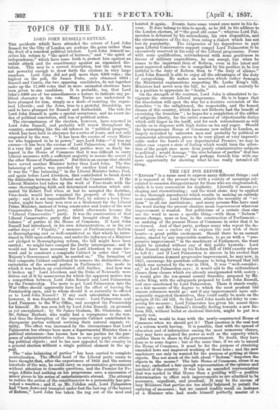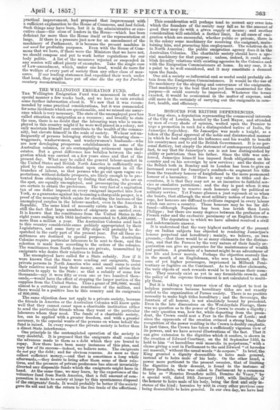THE CRY FOR REFORM.
"REFORM " is a name used to express many different things ; and it is repeated at the present day with a variety of meanings calculated to occasion disappointment for those who are singleminded, while it is very convenient for duplicity. Literally it means reshaping and reconstituting ; and the word alone may be applied to any thorough amendment which results in making an entirely new commodity. Lord Palmerston admits the necessity of " reform " in all our institutions ; and many persons *lio have used the word during the present election mean improvement wherever improvement is wanted. But politicians of a certain class also use the word to mean a specific thing—with them "Reform" means change, more or less, iii the construction of Parliament— an undoing of the present House of Commons in order that it be re-formed. And of that party, perhaps many who repeat the demand only use a cuckoo cry to express the real wish of their hearts—a great public excitement. Should there be an earnest desire, shared by any respectable number, to go on with a "progressive improvement" in the machinery of Parliament, the want might be satisfied without any of this public hysteria : Lord John Russell might take up his Reform Bill of 1854 exactly where he left it; and if Lord Palmerston is sincere in his avowal that our institutions demand progressive improvement, he may now, in 1857, encourage his quondam colleague to bring forward that bill which was arrested by the war in 1854. It was "well-considered," as Lord Palmerston says ; it would add to the enfranchised. classes those classes which are already amalgamated with society ; it would give the ten-pound county franchise proposed by Mr. Locke King, with the safeguards proposed by Lord John Russell, and once sanctioned by Lord Palmerston. There it stands ready, as a fair measure of the degree to which the most prudent but sincere reformers would go : and if any improvements have subsequently suggested themselves, they could easily be made on the margin of the old bill. So that Lord John needs not delay in composing his measure ; Lord Palmerston has given his assent thee years ago ; and Mr. Disraeli's friendly feeling towards a new Reform Bill, without ballot or electoral districts, might be put to a speedy test. But what would be done with the newly-constructed House of Commons when we should get it ? That question is the real test of a reform worth having. It is possible, that with the spread of education mid of information among the most numerous classes, they may have acquired the power as well as the capacity which entitles them to share in the government. No doubt, they have done so to some degree ; but at the same time, if we are to amend the House of Commons, it must he for the purpose of obtaining amended laws and improved working of those laws ; and the new machinery can only be wanted for the purpose of getting at these objects. Has not much of the talk about "-Reform" forgotten the objects in the means ? The late House of Commons, abuse it as we may, embodied a fair enough representation of the opinion and intellect of the country. It was less an amended representation that was needed in that House than a guiding mill—a positive determination to effect such improvements as are admitted to be necessary, expedient, and practical. It may be the excuse of lazy Ministers that parties are too nicely balanced to permit the carrying of measures ; but we cannot readily recall an instance of a Minister who had made himself perfectly master of a practical improvement, had proposed that improvement with a sufficient explanation to the House of Commons, and had failed. Such things may have been, but it is the administrative or executive class—the class of leaders in the House—which has been deficient far more than the House itself or the representation at large. If there is a pressure just now for an amendment of the machinery of Parliament, it is because the present machine is not used for profitable purposes. Even with the House of Commons that we have, if there were the Ministers that we have not, we should compose and put to work better regulations for our body politic. A list of the measures -rejected or suspended in any session will afford plenty of examples. Take the single case of Law-amendment, which, under one head, would do more for the welfare of every part of society than any other class of measures. If our leading statesmen had expedited their work under that head, they might have put off sine die the cry for Parliamentary reconstruction.



































 Previous page
Previous page